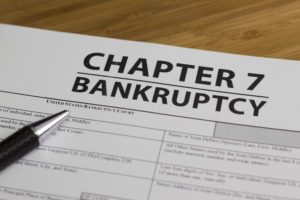
Chapter 7 Bankruptcy Exemptions – Protect What Matters Most
One of the biggest fears people have about filing for Chapter 7 is losing everything they own. And that’s where exemptions in Chapter 7 bankruptcy come in.
If you’re thinking about filing, you may be wondering: Will I lose my house? My car? My furniture or the money in my bank account?
The good news is that bankruptcy exemptions exist to protect many of your most important belongings. And if you choose the right attorney, you’ll feel much more control over your decisions and how they’ll impact your future goals.
As a Memphis bankruptcy lawyer, I help people use these exemptions every day to keep the things they need while wiping out overwhelming debt. So let’s walk through how exemptions work and how they can help you get a fresh start without starting from scratch.
What Are Bankruptcy Exemptions?
Bankruptcy exemptions are legal protections that allow you to keep certain types of property during a Chapter 7 bankruptcy. In simple terms, exemptions tell the court: This belongs to the person filing, and they need it to live and rebuild.
Without exemptions, the bankruptcy trustee could sell all of your belongings to pay back creditors. With them, you have certain protections to keep yourself afloat.
 What Kinds of Property Can Be Exempt?
What Kinds of Property Can Be Exempt?
Every state has its own rules related to exemptions. In our home state of Tennessee, you may be able to use either Tennessee state exemptions or federal bankruptcy exemptions, depending on your specific situation. We’ll help you choose whichever option protects you better.
Common types of exempt property include:
- Your home or car, with certain limitations
- Household goods and furniture
- Clothing and personal items
- Pensions and retirement accounts
- Tools you need for work
- Public benefits like Social Security, unemployment, and veterans’ benefits
- Some or all of the money in your bank account
There are also “wildcard” exemptions that can be used to protect other belongings, up to a certain dollar amount.
As you can see from the above list, this carve-out in the law is meant to protect people so they don’t lose everything in a bankruptcy.
After all, bankruptcy isn’t about punishment – it’s meant to help you get a fresh start and get back on your feet.
 How Exemptions Work in Chapter 7
How Exemptions Work in Chapter 7
When you file for Chapter 7, you’ll list all your property in your bankruptcy paperwork, along with which exemptions you’re using to protect each item. Your bankruptcy lawyer will go over this with you carefully to make sure everything you’re entitled to keep is protected.
As long as your assets fall within the exemption limits, the bankruptcy trustee can’t take them to pay creditors.
If something you own is worth more than the exemption covers, the trustee could choose to sell it. But this is rare, especially when you work with a trusted attorney who talks through everything with you in advance.
The Limitations of Exemptions
While exemptions are a powerful tool in Chapter 7 bankruptcy, they do have limits.
Chapter 7 doesn’t automatically have the power to stop foreclosure or repossession long-term. There are some exemptions related to homes and cars, but it depends on your situation and the equity you’ve paid into them.
Exemptions also don’t cover certain luxury items or collectibles.
But if exemptions don’t protect your property in the way you need, you still have options.
For example, Chapter 13 allows you to keep everything you own while you repay some or all of your debts through a structured 3- to 5-year payment plan based on what you can afford. It stops foreclosure and repossession and its tracks – no exemptions needed.
When we sit down with our clients at their free first consultation, we always talk through your worries and goals. We let you know your best options for protecting your property and setting yourself up well in the future.
 How Our Lawyers Can Help with Exemptions in Chapter 7 Bankruptcy
How Our Lawyers Can Help with Exemptions in Chapter 7 Bankruptcy
Exemptions can be tricky, and choosing the wrong ones – or missing something – can cost you. That’s why it’s so important to have a lawyer who understands exemption laws.
Our award-winning team will help you figure out the best strategy to protect your property. We make the process as smooth as possible and communicate with you every step of the way.
If you’re thinking about Chapter 7 and worried about what you might lose, let’s talk. I’m here to help you understand your rights, protect your belongings, and start fresh with less stress.
Contact me today for a free consultation, and take the first step toward your financial freedom.
